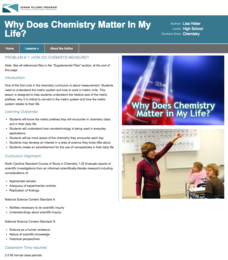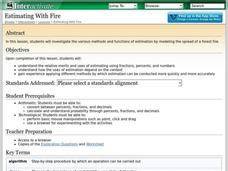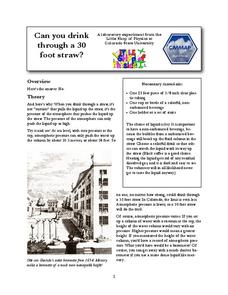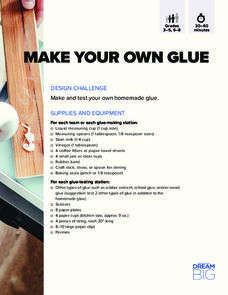Santa Monica College
Introducing Measurements in the Laboratory
We use basic units of measurement to break down things and communicate clearly. The first lesson in an 11-part series teaches the proper way to measure various items. It starts simply with measuring the dimensions and areas of geometric...
Kenan Fellows
How Do Chemists Measure?
Young chemists create gold nanoparticles as they learn to measure accurately with the metric system. They create an advertisement for the application of nanotechnology to complete the first lesson in a series of six.
American Chemical Society
Density: Sink and Float for Liquids
We don't think of liquids as floating typically, but a quick look at any oil spill tells a different story. Lesson explores various densities of liquids and why this fact is important. After observing the density variation, scholars...
Discovery Education
Malachi's Medication
What's on a prescription medicine label? After learners practice measuring Malachi's prescribed dosage for his medication, they collaboratively discuss and explain why measuring it with the proper measuring tools is essential. Young...
media.yurisnight.net
Science Lesson Plan: Our Solar System: I Wonder?
Ever wonder why Pluto isn't considered a planet? Or how large the Earth is compared to the other inner planets? Explore the universe with a series of projects that simulate different aspects of our solar system. The activities require...
Institute of Electrical and Electronics Engineers
Try Your Hand at Nano
Fascinating reading about nanotechnology, nanoscale properties, and liquid crystals precedes a fun activity for young engineers. They measure their hands in nanometers, research, and then investigate how heat effects a sheet containing...
Teach Engineering
Density Column Lab - Part 2
Groups suspend objects within layers of liquids to determine the densities of different liquids and compare them to the densities of objects calculated in Part 1. The groups then carefully test their calculations by layering the liquids...
Teach Engineering
Red Cabbage Chemistry
Using the natural pH indicator of red cabbage juice, groups determine the pH of different everyday liquids. As they work, pupils gain an understanding of pH that may help deal with contaminants in the water supply.
Shodor Education Foundation
Estimating With Fire
Watch the damage from a forest fire in this interactive simulation activity that challenges learners to estimate the burn area using different approaches. Learners are given a worksheet to track the different burn patterns and practice...
Colorado State University
Can You Drink Through a 30 Foot Straw?
Drinking straws are a pretty simple device ... or, are they? Explore the possibility of sipping a beverage 30 feet away with an engaging activity that's sure to keep pupils guessing. Just place a long piece of plastic tubing in a glass,...
American Chemical Society
Density of Water
We know solids have a density we can measure, but what about liquids? Lesson explores this concept and allows scholars to explore the relationship between volume and density. Graphing and analysis questions round out the activity.
Baylor College
Serving Sizes
Are serving sizes for different foods always appropriate for what you need? In this hands-on activity, learners work in groups to estimate what one serving size of various foods are, and then evaluate their hypotheses by measuring real...
Berkshire Museum
Where’s the Water?: Acting Out Science Cycles
Young scientists transform themselves into rivers, oceans, clouds, and drops of water in order to explore the water cycle. After assigning and explaining to students their different roles in the activity, the teacher reads aloud a...
American Chemical Society
Production of a Gas - Controlling a Chemical Reaction
Though the publisher designated this unit for use with third through eighth grades, this particular lesson would be best used with middle schoolers due to the specific measurement skills required. Basically, they set up the reaction...
DiscoverE
Make Your Own Glue
You won't regret being stuck with this activity. By mixing a variety of household items, pupils create their own glue. They test the tensile strength of their glue and compare it to that of other adhesives.
Curated OER
What Floats Your Boat?
This open-ended boat building exercise is meant to be part of a three-lesson series on ships. Links to the other two lessons are included. This particular part is mostly a group lab activity in which they build a boat, find its load line...
Foundation for Water & Energy Education
What is the Water Cycle? Activity A
Hydrologists create a concept map about how water is used and a sentence strip defining water and describing its unique properties. Small groups work together to fill a small milk carton and compute the mass of water inside. The next...
LABScI
Viscosity: The Fluid Lab
There's more to fluids than meet the eye—they include gases, liquids, and polymers, too! Scholars complete three hands-on activities exploring different properties of fluids. They explore viscosity by measuring the resistance, or...
Institute of Electrical and Electronics Engineers
Keep it Cool
This cool lesson plan is ideal for elementary engineers or physical scientists, especially when learning about heat transfer and insulation. After reading a page of background information, engineering teams collaborate to design and...
It's About Time
Volcanic Hazards: Flows
Did you know the largest volcano in our solar system is on Mars? Young scholars measure and experiment with how to predict lava and mud flows. This knowledge leads to better evacuation, safety, and preventative methods.
Pace University
Volume and Capacity
Differentiated instruction through leveled learning contracts boosts scholars' knowledge of volume and capacity. Participants split into three groups based on ability and interest before choosing three activities from their learning...
Cornell University
Making a Battery
Don't be shocked when your class has a blast making their own batteries! Science scholars examine a dry cell battery, then design and construct a wet cell battery. The activity guides them through the parts of a battery, the variables...
Food a Fact of Life
Soup-er!
Is there anything better than hot soup on a cold day? Kids prepare either vegetable chowder or minestrone soup in an activity that features the use of the stove top.
NASA
Cleaning Water
From their sweat to the water vapor in their breath, astronauts recycle every possible drop of water while in space. After watching a short video describing the different ways materials are recycled and reused in space shuttles, young...
























